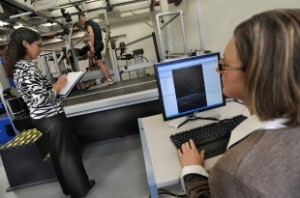Virtual engineering offers leaner, faster manufacturing
In today’s fast-moving business environment, the ability to change automated assembly and production systems quickly and efficiently, at lowest cost and risk across multiple global locations, is vital.
Now, innovative computer experts have created a software tool with the potential to save a wide variety of manufacturers many millions every year.
Academics at Loughborough University, England have developed a virtual-reality engineering environment that offers manufacturers a faster and more focused tool for the creation of their automation systems – from electronic goods assembly to the food and packaging industries.
The Business Driven Automation (BDA) system has been made in the automotive sector in partnership with the Ford Motor Company, ThyssenKrupp System Engineering and Schneider Electric.
BDA provides a virtual reality (VR) engineering environment for manufacturing companies to enable them to validate and change automated assembly and production systems quickly and efficiently, at minimal cost/risk across multiple global locations. The approach is highly generic and applicable to almost all industrial automation sectors.
Today’s automation systems are difficult and complex to service, reconfigure and integrate. Moving away from these traditional, slower practices, the new software engineering tool enables rapid configuration and modification of factory automation systems.
At Loughborough’s Innovative Manufacturing & Construction Research Centre (IMCRC), the project’s principal investigator Professor Rob Harrison said: “We have developed innovative software to give a quick, accurate, virtual 3D prototype view of assembly machine behaviour before they are physically built. We aim to make these tools much easier and faster, and we want to see them used throughout the machine lifecycle, not just at initial design and build.”
Virtual design tools help Ford engineers to improve the design aesthetics, engineering and ergonomics of its cars and trucks.
Speaking for Ford’s manufacturing engineering department, Les Lee, said: “Collaboration offers opportunities for reduced costs, faster time-to-market, improved customer satisfaction, strategic thinking and quicker problem solving. The IMCRC BDA project is a fine example where measurable benefit is being delivered with shared knowledge utilisation and the creation of innovative products.”
Ford is a global automotive industry leader that manufactures or distributes automobiles across six continents. With about 200,000 employees and 90 plants worldwide, the company’s automotive brands include Ford, Lincoln, Mercury and Volvo.
The commercialisation of the IMCRC project received funding support from the UK’s Engineering & Physical Sciences Research Council (EPSRC) through the knowledge transfer account awarded to Loughborough University. It has also received support from the intellectual property commercialisation team that is part of the universityÕs enterprise office.
Launched in 2001, the purpose of the EPSRC-funded Innovative Manufacturing Research Centres (IMRCs) was to provide a focal point for research excellence, collaborate actively with UK businesses and facilitate knowledge transfer and exploitation of research results; making a vital collective contribution to the future of the UK economy and society.
Loughborough is one of the country’s leading universities, with an international reputation for serious research, excellence in teaching, strong links with industry, and unrivalled achievement in sport and its underpinning academic disciplines. It is consistently ranked in the top 20 of UK universities in national newspaper league tables.
Loughborough University’s IMCRC is the largest of the EPSRC-funded centres, in terms of the number of academics, size of grant and breadth of work undertaken. The centre covers a range of research issues, from design, processes and materials to business and management and includes manufacturing, construction, systems engineering and computer science.
A main advantage of the centre is the cross-disciplinary research, as many projects bring together academics from different areas to investigate a problem. The purpose of the centre is to provide a focal point for research excellence, to actively collaborate with UK businesses and facilitate knowledge transfer and exploitation of research results, making a vital collective contribution to the future of the UK economy and society.




